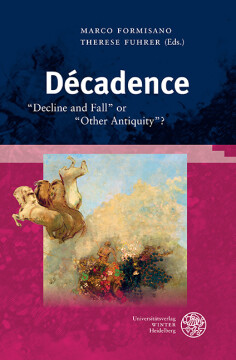
BUCH
Décadence
“Decline and Fall” or “Other Antiquity”?
Herausgeber: Formisano, Marco | Fuhrer, Therese | Stock, Anna-Lena
Bibliothek der klassischen Altertumswissenschaften, Neue Folge, 2. Reihe, Bd. 140
2014
Zusätzliche Informationen
Bibliografische Daten
Abstract
No scholar today would describe late antiquity as an age of “decline and fall”, as Gibbon did; instead, to use Marrou's term, it is seen as an “other antiquity”, which deserves to be investigated on its own terms. Yet the idea of a decadent period, accompanied by a fascination for the image of antiquity on the wane, continues to live in scholarly minds, as is suggested, after all, by the recurring insistence on the point that late antiquity was not a period of decline. This collection of papers engages in a productive way with the fascination exerted by the concept of an era in decline and a literary and artistic fin-de-siècle atmosphere, evoked in the very Title ‘Décadence’. Whether this fascination is seen as a question of the history of reception or as an ongoing phenomenon, it rarely emerges to the surface of scholarly discussions. This volume invites us to reconsider these questions by making decadent late antiquity a paradigm of interpretation in connection with a conscious and sophisticated re-use of the history of reception.
Inhaltsverzeichnis
| Zwischenüberschrift | Seite | Aktion | Preis |
|---|---|---|---|
| The Library of the Other Antiquity | V | ||
| Contents | 1 | ||
| Preface | 3 | ||
| Marco Formisano: Reading Décadence – Reception and the Subaltern Late Antiquity | 7 | ||
| I. Décadence in Antiquity | 17 | ||
| Therese Fuhrer: Das Interesse am menschlichen Scheitern – Antike Konstruktionen des ‚Niedergangs‘ einer Kultur | 19 | ||
| Gillian Clark: Fragile Brilliance – Augustine, decadence, and “other antiquity | 35 | ||
| II. Imagining Late Antiquity: Décadence and Modernity | 53 | ||
| Helmut Pfeiffer: Flauberts Versuchung der Spätantike | 55 | ||
| Carlo Santini: „Aus einem Staat, der an einem Sprachfehler zugrundegegangen ist“ – Musil tardo-antico | 77 | ||
| Karin Schlapbach: “Under the full impact of a catastrophic end” – Augustine and the fall of Rome in Hannah Arendt’s reading | 97 | ||
| III. The Fertility of Décadence | 113 | ||
| Michael Roberts: Friedrich Mehmel, Pompatic Poetics, and Claudian’s Epithalamium for the Marriage of Honorius and Maria | 115 | ||
| Henriette Harich-Schwarzbauer: Die ‚Lust‘ der Poesie – ‚Décadence‘ in den spätantiken Epithalamien (Claudius Claudianus, c. m. 25 und Sidonius Apollinaris, cc. 10–11; 14–15 | 133 | ||
| Danuta Shanzer: Incest and Late Antiquity – Décadence | 149 | ||
| IV. Reception: Late Antique Poetics | 169 | ||
| Stephen Hinds: ‘The self-conscious cento | 171 | ||
| Sigrid Schottenius Cullhed: Proba and Jerome | 199 | ||
| Jan Stenger: Der ‚barocke‘ Stil des Ammianus Marcellinus – Vom heuristischen Nutzen eines folgenreichen Verdikts | 223 | ||
| Étienne Wolff: Quelques jalons dans l’histoire de la réception de Sidoine Apollinaire | 249 | ||
| V. Décadence: Good to Think With? | 261 | ||
| Ilaria L.E. Ramelli: Décadence Denounced in the Controversy over Origen – Giving Up Direct Reading of Sources and Counteractions | 263 | ||
| Christoph Markschies: Décadence? Christliche Theologen der Spätantike über den Verfall von Moral und Glauben seit Kaiser Konstantin | 285 | ||
| Andreas T. Zanker: Decline and Kunstprosa – Velleius Paterculus and Eduard Norden | 299 | ||
| Notes on Contributors | 325 | ||
| Index locorum | 329 | ||
| 1.) Scripture | 329 | ||
| 2.) Ancient Literature | 329 | ||
| 3.) Medieval and Early Modern Literature | 339 | ||
| 4.) Modern Literature | 340 | ||
| Index nominum et rerum | 341 |


 Powered by CloudPublish
Powered by CloudPublish